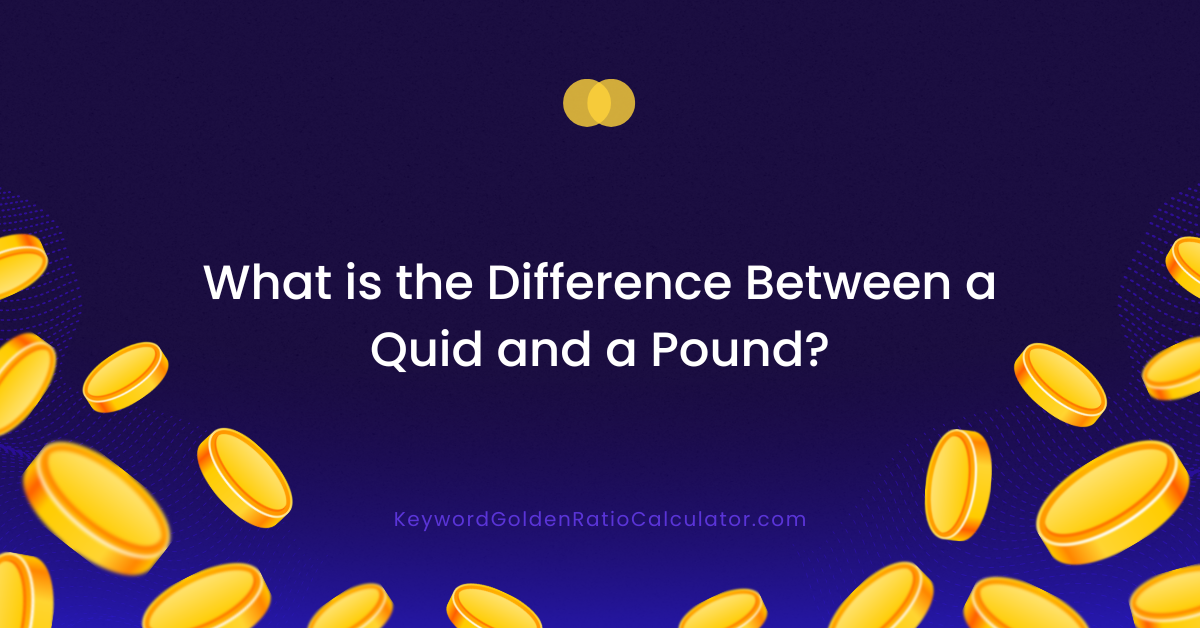Here you are, newly immersed in British culture or maybe just brushing up on your currency knowledge; you come across two terms:
‘Pound’ and ‘Quid’. Sitting at a quaint café in London, you hear the phrase, “that cuppa will be three quid, mate,” leaving you to puzzle over, “Wait, what exactly is a quid compared to a pound?”
Don’t fret; let’s demystify this seemingly complex currency quandary in this easy-to-follow guide.
Understanding the British Currency – The Pound and Quid
If you’ve found yourself a little puzzled by British currency at some point, you’re not alone.
Let’s dive straight into what exactly a ‘Pound’ and a ‘Quid’ are and get to the bottom of their peculiar relationship.
The Mighty Pound Sterling
The British Pound (GBP), also known as Pound Sterling, is the UK’s official currency.
Introduced over 1200 years ago, it is one the world’s oldest currencies still in use today.
Here are some intriguing details about the pound:
- Official Currency: It’s the official medium of exchange for the entire United Kingdom – that includes England, Scotland, Wales, and Northern Ireland.
- Symbols: It’s typically represented by a fancy ‘£’ symbol, much like the dollar sign or the euro symbol (£1 = one pound).
- Denominations: The Pound Sterling is divided into smaller units called pence, similar to how the US Dollar is divided into cents. 1 Pound = 100 pence.
Oldest currencies in the world
The Mysterious Quid
Quid, on the other hand, is a slang term for the pound.
Yes, you read that right. Quid and pound are, in essence, the same thing.
Let’s dig a little deeper into this delightful dialect.
- Simply Slang: When an individual refers to something costing a few ‘quid’, they are speaking about pounds. Quid is to the pound what ‘buck’ is to the US dollar.
- No Plural Form: No matter the quantity, you will always use ‘quid’, never ‘quids’. Whether it’s 1 quid or 1000 quid, it remains the same.
- Origins: The origins of ‘quid’ as slang for the pound are somewhat uncertain and clouded in lingual lore. One theory suggests it may have come from the Latin phrase “quid pro quo,” which means “something for something”.
“Distinguishing between pound and quid is akin to differentiating the US dollar from the colloquialism ‘buck’. Essentially, they are the same thing. One is formal, the other less so, but both refer to exactly the same amount of money.”
Practical Usage: When Should You Use ‘Pound’ vs ‘Quid’?
Understanding when to use specific terminology can be just as important as knowing what they signify. Let’s unravel these subtleties further:
In Formal Settings
In more formal settings – speaking to a bank clerk, reading a financial report, or discussing economic matters – ‘pound’ is the term of use.
Using slang such as ‘quid’ might undermine your credibility or come across as inappropriate in these contexts.
In Informal Conversation
Quid is perfect for everyday, informal situations. Amongst friends, or when chatting to a market vendor, ‘quid’ is widely understood and accepted.
It’s got a friendly, colloquial character, which makes it a suitable term in these relaxed environments.
The Takeaway
In a nutshell, there’s no need to puzzle over pounds and quids any longer.
Whether you encounter ‘quid’ or ‘pound’, remember, they refer to the same currency.
‘Quid’ carries a more relaxed, everyday vibe, while ‘pound’ is the official term and generally used in more formal settings.
“When it comes to quid and pound in the UK, it’s all about context. Know your audience, understand the setting, and you’ll nail the use of these terms every time!”
Oldest currencies in the world
FAQs – What is the Difference Between a Quid and a Pound?
What is a quid?
A quid is a colloquial term used in the United Kingdom to refer to one pound sterling (GBP), which is the official currency of the U.K.
What is a pound?
A pound, or officially known as the pound sterling, is the official currency of the United Kingdom. It’s symbolized by the pound sign (£) similar to how the dollar is symbolized by the dollar sign ($).
Are a quid and a pound the same thing?
Yes, in financial terms, a quid directly equates to the value of one pound. Essentially, they are two different names for the same monetary unit.
Where did the term ‘quid’ come from?
The origin of the term ‘quid’ isn’t certain, but it’s thought to derive from the Latin phrase ‘quid pro quo’, which means ‘something for something’. This captures the concept of exchanging something of value, like money, for goods or services.
Can I use the term ‘quid’ instead of ‘pound’ everywhere within the United Kingdom?
Yes, you can. ‘Quid’ is a widely-accepted, local slang for ‘pound’ in the UK and is understood by locals throughout the country.
How widely is the term ‘quid’ used in common speech?
The term ‘quid’ is used extensively in casual or colloquial communication in the UK. However, in formal or official contexts, the term ‘pound’ is commonly used.
Is the value of a quid different from the value of a pound?
No, a quid holds the same monetary value as a pound. The difference lies only in terminology, not in value.
Are there any other similar terms used for Pound Sterling?
Yes, similar to ‘quid’, ‘bob’ was a popular slang term for ‘shilling,’ a former currency unit in the UK. However, the term is not used as widely today.
Does the term ‘quid’ refer to any other currencies outside the UK?
Yes, in fact, the term ‘quid’ is also used colloquially in Australia, where it refers to the Australian dollar. However, its usage is more prominent in the UK.
Is the term ‘quid’ understood globally?
While ‘quid’ is universally understood in the UK, its recognition may vary globally. In countries familiar with UK slang, it may be understood as referring to a pound. However, in other countries, it may not be widely recognized.

